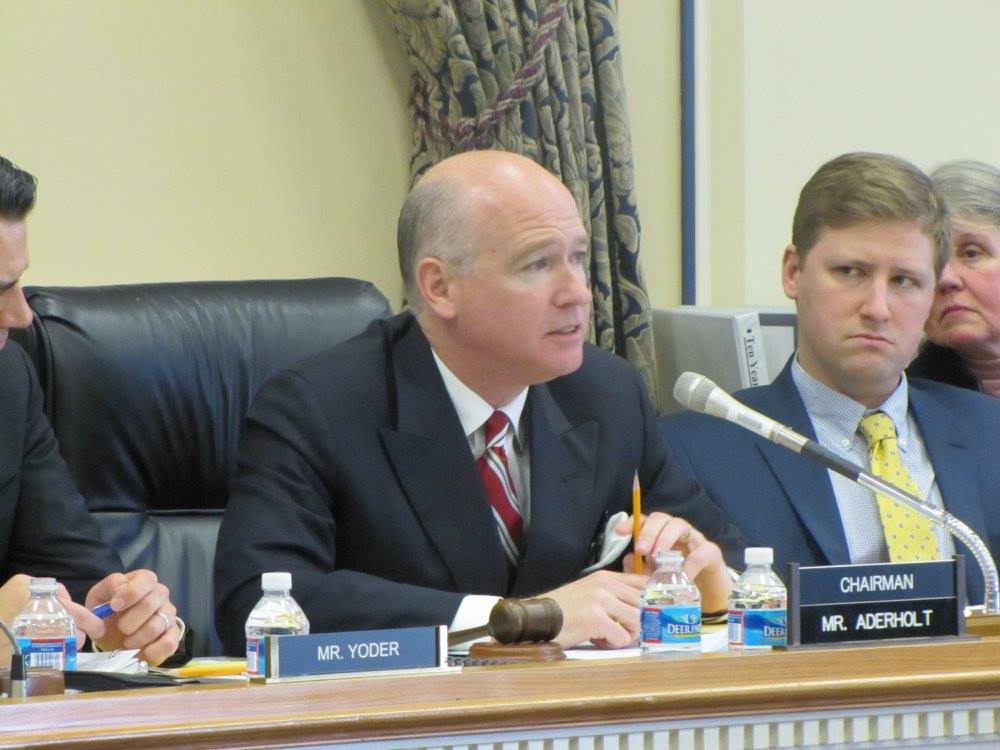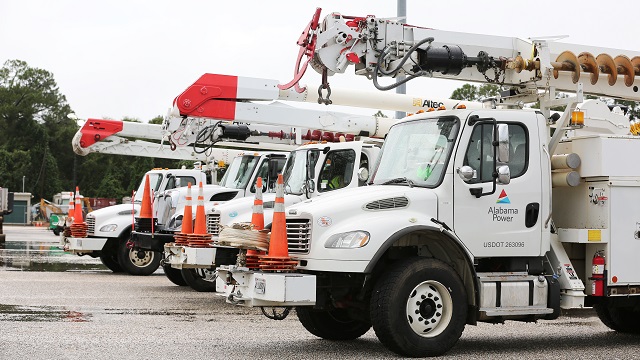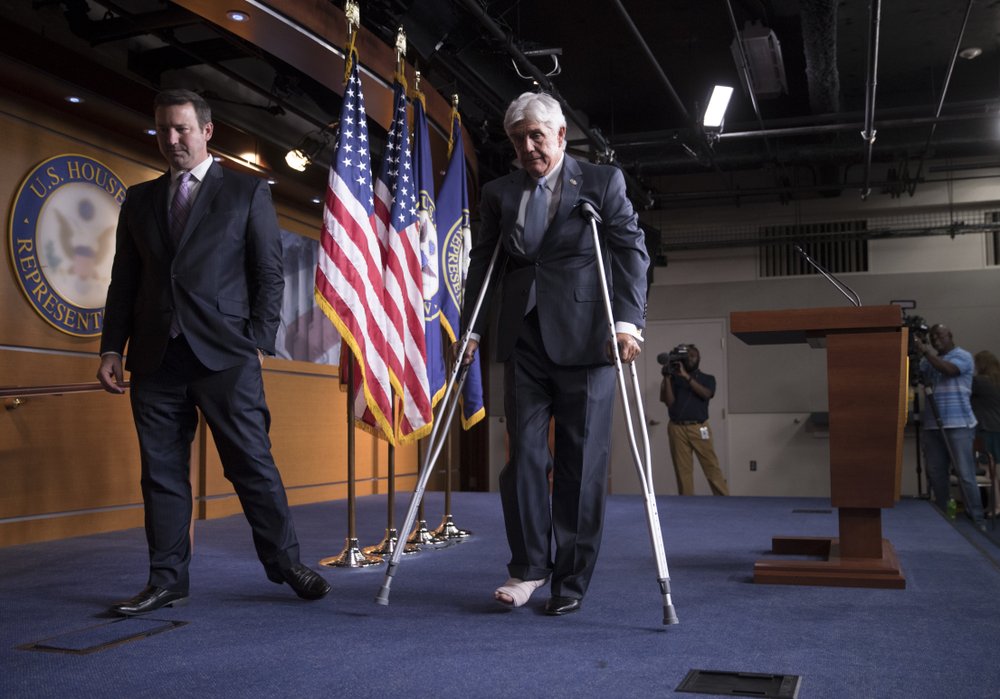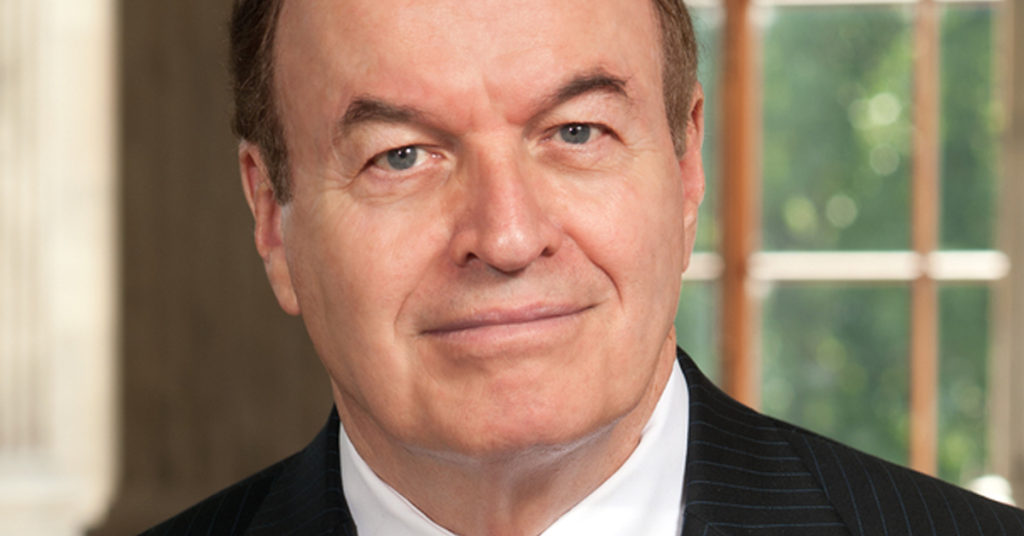Robert Aderholt named Chairman of Labor, Health and Human Services & Education Subcommittee of the House Appropriations Committee

Congressman Robert Aderholt was selected as the Chairman of the Labor, Health and Human Services & Education Subcommittee of the House Appropriations Committee on Monday. “It is an honor to have been chosen to chair this important Appropriations Subcommittee,” Rep. Aderholt said. “The Labor, Health and Human Services & Education subcommittee is responsible for the largest pool of non-defense government spending in the entire federal budget, and with that comes the commitment to renewed oversight and fiscal responsibility as we move into the Fiscal Year 23 Appropriations cycle.” “The new Republican majority in the House has made a commitment to the American people to get government spending under control,” Aderholt continued. “As chairman of this committee under Appropriations, I will be laser-focused on looking at areas where we can reign in out-of-control spending, much of it put in place during the pandemic and no longer needed.” “As the national debt approaches $33 trillion, we must get control of the discretionary, non-defense spending,” Aderholt added. “With so many threats to our national security from the likes of China, Russia, Iran, and North Korea, cutting defense spending is, in my opinion, not an option. Therefore, we must look at areas of our domestic spending that have grown wildly out of control.” “I want to use the power of the gavel to make sure that this subcommittee is meeting its commitments to the departments and agencies it funds without breaking the bank built by American taxpayers,” Aderholt concluded. “Lastly, and most certainly not least, I will work as chairman to make sure we defend the most vulnerable among us by protecting the Hyde Amendment. For decades, this amendment, which prevents tax dollars from being used to pay for abortions, received bipartisan support. Only in recent years have some on the left tried to remove this important safeguard. I will work to make sure it stays firmly in place.” House Appropriations Chairwoman Kay Granger announced, “I’m proud to have this outstanding group of Members leading the Committee at this critical time for the country. These Members understand we must find ways to cut wasteful government spending while increasing the safety and security of the American people.” “We’ve got our work cut out for us, and this is the best team to get the job done,” Chairwoman Granger added. “We have an exceptional leader in Tom Cole and an experienced lineup of subcommittee chairs, all who are committed to passing conservative appropriations bills.” The House Appropriations Committee subcommittee chairs are: Since control of the House of Representatives has shifted from the Democrats to the Republicans, that means that all the powerful House Chairs are now Republicans. Congress members Terri Sewell and Jerry Carl serve on House Appropriations along with Aderholt. Aderholt is the dean of the Alabama Congressional delegation, having served in the House of Representatives since 1996. Aderholt represents Alabama’s Fourth Congressional District. Aderholt lives in Haleyville. To connect with the author of this story, or to comment, email brandonmreporter@gmail.com.
Tommy Tuberville, congressional delegation urge Joe Biden to address energy supply chain issues

One Alabama senator, along with nearly a dozen others in Congress, have called on the president to address supply chain shortages within the energy sector. U.S. Sen. Tommy Tuberville, R-AL, penned a letter to President Joe Biden to express concerns over the supply of transformers and other raw materials used to manufacture energy components for the Southeastern United States’ energy grid amid rising concerns from local power companies as the hurricane season moves through its peak. “Transformers are a crucial component of electricity delivery at substations and utility poles,” the delegation wrote in the letter to the president. “This equipment is important not only for keeping up with economic growth, but for restoring power after storms and other extreme weather events. In the past months, costs are skyrocketing, and lead times for some manufacturers are up to two years – while others are not taking orders at all.” In the letter, the delegation, according to the release, encouraged the president to issue a temporary suspension of the Department of Energy’s “most recent conservation standards for transformers” as those components require more steel than in past manufacturing processes. The delegation also urged Biden to “engage the Federal Emergency Management Agency to work with suppliers to determine if there is a stockpile of transformers that were bought using federal dollars that can be used in emergency situations.” Tuberville was joined writing the letter by U.S. Sens. Bill Hagerty, R-TN; Roger Wicker, R-MS; Cindy Hyde-Smith, R-MS; and Marco Rubio, R-FL; and U.S. Reps. David Kustoff, R-TN; Diana Harshbarger, R-TN; John Rose, R-TN; Scott DesJarlais, R-TN; Tim Burchett, R-TN; Morgan Griffith, R-VA; and Chuck Fleischmann, R-TN.
Mo Brooks and Gary Palmer urge FBI director to call Congressional shooting an ‘act of domestic terrorism’

Mo Brooks and Gary Palmer joined other leaders, sending a letter to FBI Director Christopher Wray. The letter urges Wray to call the 2017 shooting on Congress during a baseball game an act of domestic terrorism. Four people were shot during the practice session for the Annual Congressional Baseball game, including Congressman Steve Scalise, Capitol police officer Crystal Griner, congressional aide Zack Barth, and lobbyist Matt Mika. The shooter, James Hodgkinson, was shot and died from his wounds. According to CNN, Hodgkinson was a small business owner in Illinois who was very public on social media about his support of Bernie Sanders and his hatred of conservatives and President Donald Trump. Brooks stated on Twitter, “I joined several GOP colleagues who were targeted in 2017 by a Socialist gunman in sending a letter to @FBI Dir Wray, urging him to call the shooting what it was: an act of domestic terrorism that sought to assassinate Republican members of Congress. It was not “suicide by cop.” I joined several GOP colleagues who were targeted in 2017 by a Socialist gunman in sending a letter to @FBI Dir Wray, urging him to call the shooting what it was: an act of domestic terrorism that sought to assassinate Republican members of Congress. It was not “suicide by cop.” pic.twitter.com/gYj9fwOtLI — Mo Brooks (@RepMoBrooks) May 12, 2021 Other leaders who signed the letter include H. Morgan Griffith, Rodney Davis, Jeff Duncan, Barry Loudermilk, John Moolenaar, Jack Bergman, Roger Williams, Scott DesJarlais, Bill Johnson, Chuck Fleischmann, Kevin Brady, Trent Kelly, and Jim Jordan.
Border security bargainers trade offers as deadline nears

Congressional bargainers traded offers and worked toward a border security compromise Friday that would avert a fresh federal shutdown and resolve a clash with President Donald Trump that has dominated the opening weeks of divided government. differences Both sides’ negotiators expressed optimism that an accord could be reached soon on a spending package for physical barriers along the Southwest border and other security measures. Participants said the agreement would all but certainly be well below the $5.7 billion Trump has demanded to build his proposed wall, and much closer to the $1.6 billion that was in a bipartisan Senate bill last year. “That’s what we’re working toward,” said Rep. Lucille Roybal-Allard, Democrat-Calif., one of the bargainers. Besides the dollar figure, talks were focusing on the type and location of barriers, participants said. Also in play were the number of beds the federal Immigration and Customs Enforcement agency could have for detained migrants, and how much aid for natural disaster relief would be included. Money for high-tech surveillance equipment and more personnel was also expected to be included. No one ruled out that last-minute problems could emerge, especially with Trump’s penchant for head-snapping turnabouts. But the momentum was clearly toward clinching an agreement that Congress could pass by next Friday. The next day, government agencies would have to close again for lack of money, if no deal is reached. Negotiator Rep. Chuck Fleischmann, Republican-Tenn., said the latest Democratic offer was “much more reasonable.” And Democratic bargainer Rep. Pete Aguilar of California said, “Each time an offer and a counter is going back and forth the number of open items is reducing. That is progress.” Rep. Mark Meadows, Republican-N.C., who leads the hard-right House Freedom Caucus, said he spoke Thursday night to Trump, who he said was in “wait and see” mode. Meadows said he expects an agreement to provide something closer to $1.6 billion. “I’m not optimistic it’ll be something the president can support,” Meadows said. A conservative House GOP aide said to back a deal, Freedom Caucus members wanted at least $2 billion for barriers and no restrictions on new construction, land acquisition or new types of barriers that could be built. The aide also said the agreement need not contain the term “wall” — a word that was a premier plank of Trump’s presidential campaign, and which Trump has lately alternated between embracing and abandoning. The person would talk only on condition of anonymity to describe private talks. Meadows’ assessment of Trump’s view clashed with one expressed Thursday by Sen. Richard Shelby of Alabama, the chief GOP bargainer. He described the emerging deal to Trump in the Oval Office and told reporters the session was “the most positive meeting I’ve had in a long time.” Shelby said that if the final agreement followed the outline currently under discussion, he believed Trump “would sign it.” Trump has modest leverage in the battle. Besides facing unified Democratic opposition, there is virtually no GOP support in Congress for another shutdown. When congressional talks began, Trump called them a “waste of time.” “They’ve got to come to a solution that actually does what they promised they would do, which is protect the American people,” White House spokesman Hogan Gidley said on Fox News. Trump faces an aggressive, Democratic-led House that is ramping up investigations into Russian involvement in his campaign and businesses and trying to get access to his income tax returns. But ending the border security fight would close one chapter that’s bruised him, including his surrender after a 35-day partial federal shutdown that he started by unsuccessfully demanding taxpayer money to build the border wall. Even with a deal, it was possible Trump might try using claims of executive powers to reach for more wall funding. That could spark votes by Congress to block him, which Trump could veto but would still inflict political damage. Sen. Lindsay Graham, Republican-S.C., said Thursday that an accord could be “a good down payment” and added, “There are other ways to do it and I expect the president to go it alone in some fashion.” Acting White House Chief of Staff Mick Mulvaney said on Fox News Channel’s “Hannity” on Wednesday, “If Congress won’t participate or won’t go along, we’ll figure out a way to do it with executive authority.” Members of both parties have expressed opposition to Trump bypassing Congress by declaring a national emergency at the border, a move that would be certain to produce lawsuits that could block the money. Lawmakers have grown accustomed to expecting the unexpected from Trump. Before Christmas, both parties’ leaders believed he’d support a bipartisan deal that would have prevented the recently ended shutdown, only to reverse himself under criticism from conservative pundits and lawmakers. “There’s a small light at the end of the tunnel,” said Sen. Pat Roberts, Republican-Kan. “We just hope it’s not a train coming the other way.” Republished with permission from the Associated Press
Richard Shelby says ‘The dialogue is good’ as wall deadline nears

President Donald Trump and House Speaker Nancy Pelosi struck starkly different tones in their border security standoff Wednesday, as Trump planned a rally in a Texas border city he says exemplifies the need for a wall and Pelosi said she’d back any bipartisan deal congressional bargainers produce. The contrasting pathways — with Trump set to appear before raucous supporters and Pelosi signaling compromise — came with just over a week until a Feb. 15 deadline for negotiators to reach agreement or potentially face a renewed partial government shutdown. House-Senate bargainers say their talks have become increasingly substantive and some lawmakers — including Pelosi herself — expressed hopes that negotiators might produce an accord as soon as Friday. Participants said the two sides were narrowing differences in their talks. Rep. Chuck Fleischmann, Republican-Tennessee, a negotiator, said Democrats were showing some flexibility in the semantic dispute over the type of physical barriers they would accept while Republicans seemed potentially willing to limit where the structures might be built. “That basically sets the stage for a very reasonable, flexible negotiation,” he said. Other unresolved questions include the amount to be spent on border security, and whether — as Democrats have proposed — to reduce the number of detention beds for migrants available to the federal Immigration and Customs Enforcement agency, Fleischmann said. “If they come up with a bipartisan agreement, I’m happy to support it,” Pelosi, Democrat-California, told reporters. She said she hoped Trump would take “the same hands off” approach. Democrats have been in a position of strength in the talks, after Republicans lost House control in November’s elections, Trump forced a record 35-day federal shutdown and surrendered without getting $5.7 billion he’s demanded for a wall. Senate Majority Leader Mitch McConnell, Republican- Kentucky, has also given bargainers a green light to seek a deal that he’s said he hopes Trump would find “worth signing.” If Pelosi and McConnell embrace a bipartisan agreement, it could isolate Trump and pressure him to accept it without re-escalating the fight. Trump has threatened a new shutdown or a declaration of a national emergency to access other budget funds if he’s not satisfied with a deal — steps members of both parties oppose. Bargainers met Wednesday privately for nearly two hours with federal border patrol and customs officials to hear their recommendations on how to secure the Southwest border. But several lawmakers emerged with differing conclusions. No. 2 Senate Democratic leader Richard Durbin said lawmakers were told the top priority was technology that could screen vehicles for drugs or migrants at border ports of entry. “They don’t rule out barriers, they don’t rule out fencing, but that isn’t the first priority,” Durbin told reporters. But Sen. Richard Shelby, Republican- Alabama, said the officials suggested a three-pronged approach using barriers, technology and personnel. He said the closed-door session was constructive. “The dialogue is good. The tone is good. We’re talking about substance,” Shelby said. He also said that in a phone conversation with Pelosi, “I just said, ‘Look, can we reach a yes on this in any way or are we wasting our time.’ She said, ‘No, keep working together,’ and she would like to see a legislative solution, the sooner the better.” In comments that suggested a potential avenue for agreement, some lawmakers suggested that giving local officials a say would be pivotal. “We can probably get there on some sort of enhanced barriers with local input,” said another negotiator, Rep. Henry Cuellar, Democrat-Texas. Democrats have proposed spending as much as $1.6 billion for border security including some types of physical barriers, but it remains unclear how much more money they’d accept as part of a deal. Cuellar said $5.7 billion for the wall is “not going to happen.” Meanwhile, the White House said Trump will hold his first campaign rally of the year next Monday in El Paso, Texas. His campaign manager, Brad Parscale, tweeted that the rally will be held “less than 1000 feet from the successful border fence that keeps El Paso safe!” In his State of the Union address Tuesday, Trump cited El Paso as once having “extremely high rates of violent crime. He asserted that with its wall, “El Paso is one of the safest cities in our country.” In fact, El Paso has never been considered one of the nation’s most dangerous cities and its trends in violent crime mirror national swings. In 2005, the city had a murder rate of 2.5 for every 100,000 residents, compared with a national rate of 5.6. By 2010 after the wall was built, El Paso’s murder rate had dropped to 0.9 for every 100,000 residents, compared with a national average of 4.8. Rep. Veronica Escobar, Democrat-Texas, tweeted that “El Paso has been one of the safest cities in the nation long before the wall was built in 2008. #WallsDontWork.” “El Paso is safe due to its people, the good community relations with law enforcement, and the trust of all communities in our local institutions,” Fernando Garcia, executive director of the Border Network for Human Rights, said in a statement. “El Pasoans should be offended by the way the president used our community to advance his racist and xenophobic agenda.” Republished with permission from the Associated Press


